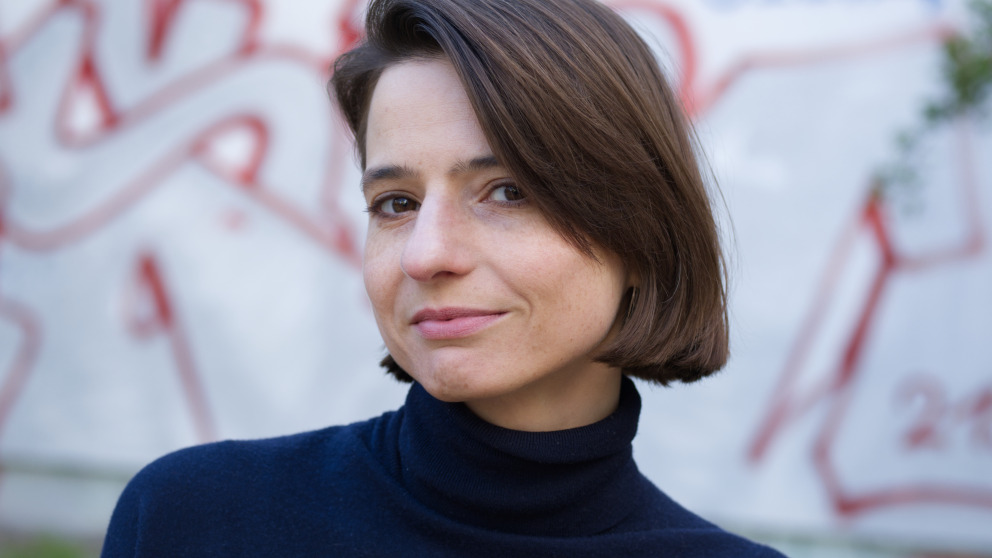Multimodal Research - Straddling Science, Design and Art
30.10.2023
Michaela Büsse is a fellow at the Research Institute for Sustainability (RIFS). Her work casts a spotlight on socio-material transformations in the context of speculative urbanism, the energy transition, and climate change. In this interview, she explains her current research on visionary energy islands and talks about her forthcoming event at Berlin Science Week on 3 November: “Building (with) Nature”.

Could you please explain how you do your research and why you take this approach?
Michaela Büsse: My research is interdisciplinary and blends elements of the humanities, social sciences, and design. I originally studied media and communication, then design and urban studies, and eventually wrote my doctoral thesis in cultural anthropology. As a consequence, I use a variety of classical social scientific methods such as interviews, media analysis, and field research, but I also work artistically by producing films and other visual "outputs." My research occupies a space between artistic research and scientific practice. I am trying to reach a broader audience with my work – across the scientific community and the general public – and to draw attention to the topics my research explores. I take this approach because multimodal work is a form of knowledge production that achieves something that textual work cannot. It enables me to generate and share knowledge in a completely different way, using sounds and images. This aesthetic experience opens our eyes to connections between places, people, and events that would otherwise go unnoticed, such as changes in the environment. This makes it possible to see things from a perspective that goes beyond rational comprehension – especially where we are not directly affected by a phenomenon.
What can you tell us about the project you plan to pursue during your fellowship?
M. B.: The project focuses on so-called “energy islands”. These as yet unbuilt large-scale infrastructures in the Baltic and North Seas are intended to serve as offshore hubs for renewable power generation, combining solar and wind energy, and possibly also wave power in the future. Energy generated on these islands could be converted into green hydrogen on location. It is a vision that promises to deliver a total solution for the energy transition. The scale of the technical challenges involved mean that this is all still a long way off – and indeed may never be properly realized. What interests me is how these visions of the energy transition emerge and how they are subsequently materialized. Who creates and controls them? Where and how do they take shape? What interests are behind these technological developments? And what political and economic processes set them in motion? It is also worth noting that this vision lends the North and Baltic Seas a new role as potential sources of energy that we can harness for our own ends. The bulk of renewable energy infrastructure is built on land at present. These infrastructures loom larger on land, where they attract opposition more frequently. Their development is often fraught with conflict and subject to negotiation. Outsourcing this process to the ocean shifts the potential for conflict and alters our relationship to these waters. When the sea is perceived mainly as an infrastructure, what happens to symbolic and cultural perceptions of the North Sea and the Baltic? How does this concept engage with ideas of the sea as a habitat, as a projection space, and as an archive of the past? I am especially interested in the moment in which these visions translate into the planning and development of an energy island and what shifts and transformations occur in the process.
How do you go about your research?
M. B.: I'm looking at three pilot projects in Germany, Denmark and the Netherlands. Some of these projects involve the conversion of existing oil rigs for renewable energy generation and some the development of completely new islands. To be precise: these are not so much islands as they are “hubs” that will bundle various infrastructures in one place. My research looks at the methods used in their development and planning, the technologies involved, the hopes associated with them and the actors involved. So I'm examining plans and promotional materials for the projects, looking at their financing structures and procedures, and interviewing scientists and engineers involved in their development. The decisions taken in these pilot projects offer us a window onto the future of the energy transition and indicate its likely movers and shakers.
What can the audience expect from your contribution to this year's Berlin Science Week?
M. B.: We are showing a film about a coastal restoration project in the Netherlands, titled "Building with Nature", which I made between 2021-2023. The film highlights the crucial role of sand in shaping our environment and coastal landscapes in particular. In this case, I examine a large-scale experiment that has been running for over ten years, the so-called Zandmotor. This involved the creation of an artificial peninsula of sand off the coast of The Hague, which is expected to degrade over the course of 20 years as erosion distributes the sand across beaches north of The Hague. The film shows how this experiment came about, how the engineers constructed Zandmotor, and various unanticipated developments since. It also shows that while we can try to model experiments like this, so much remains unpredictable, and projects in which humans interact with nature can only be controlled to a limited extent. We will discuss this in more depth in a discussion following the film. What is the relationship between mathematical models and physical reality? What does the film have to say about our assumption of the malleability of nature? And, finally, we will also talk about film as a method in science and consider what film can convey that text cannot.
